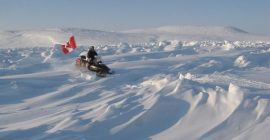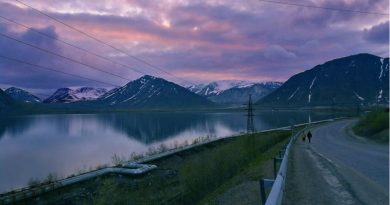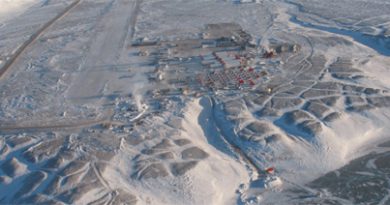Concern about lack of Arctic development in U.S. and Canada
 In recent days, two op-eds on the Arctic have been published in North American newspapers. In the Canadian daily, the Toronto Star, Michael Byers, a professor at the University of British Columbia and an expert on the Arctic, penned a piece lamenting Northern Canada’s lack of development compared to Russia.
In recent days, two op-eds on the Arctic have been published in North American newspapers. In the Canadian daily, the Toronto Star, Michael Byers, a professor at the University of British Columbia and an expert on the Arctic, penned a piece lamenting Northern Canada’s lack of development compared to Russia.
Since he is currently a visiting professor at Novosibirsk University, located in south-central Russia near Kazakhstan, he has an on-the-ground view of Russian politics and the country’s development of its northern region. In his article, he focuses on Russia’s growing Arctic infrastructure, especially with regard to transportation links like the Northern Sea Route, the expansion of the Trans-Siberian Railway, and the possibility of building a tunnel under the Bering Strait to Alaska.
In a lengthier op-ed he wrote for Al-Jazeera, he goes into more detail on Russia’s history of development in its Arctic region, concluding, “the Russian Bear still dominates the Arctic.”
In both articles, he notes that the U.S. opposes that parts of the Northern Sea Route, north of Russia, and the Northwest Passage, within the Canadian Arctic Archipelago, constitute internal waters. The U.S. instead prefers to guarantee the right of passage for its ships. For now, the U.S. has agreed to disagree with Canada and Russia.
Does the U.S. need to ‘catch up’ to Arctic neighbors?
In the Washington Post, Heather Conley, Senior Fellow and Director of CSIS’s Europe Program, wrote an op-ed entitled somewhat facetiously, “The colder war: U.S., Russia, and others are vying for control of Santa’s back yard.” She worries that the U.S. is running out of time to catch up to its Arctic neighbors in terms of capacity. The country needs to level the playing field, especially by investing in properly equipping its Coast Guard for Arctic operations, she suggests. She is right to worry about the lack of an operational heavy-duty American icebreaker, and the fact that we have to lease them from other countries.
However, some of her references to other countries upping their game in the Arctic are perhaps overblown. For instance, she notes, “Even China has entered the Arctic race; it constructed the world’s largest non-nuclear icebreaker to conduct scientific research in the Arctic.” The race in the Arctic, if we want to call it as such, has more to do with extracting its resources. Building icebreakers for scientific research, while a notable accomplishment, will still not allow China to stake any material claim to the Arctic, so it is not a true player in the race for the resources. China and its entrepreneurs can, however, attempt to play a secondary role in the race for resources by doing things such as purchasing land or investing in development. Yet still, countries with actual sovereignty in the Arctic, such as Iceland, can thwart these attempts.
All three op-eds make use of cold war puns or imagery in their titles, which in way tends to promote the idea that there is a conflict in the Arctic. Let’s not forget that the Russian air force and NORAD recently cooperated in a joint counter air-terrorism exercise, Operation Vigilant Eagle, over the Bering Sea. And that all eight member states of the Arctic Council signed the historic Search and Rescue Agreement in May 2011.
Both Byers and Conley worry that their own countries are falling behind while others move ahead. I think one would be hard-pressed to find a similar op-ed from a Russian journalist criticizing the state of their country’s progress up north, even though the country has a gargantuan task ahead of it in upgrading its infrastructure, like all of the Arctic nations. But I will do my best.



